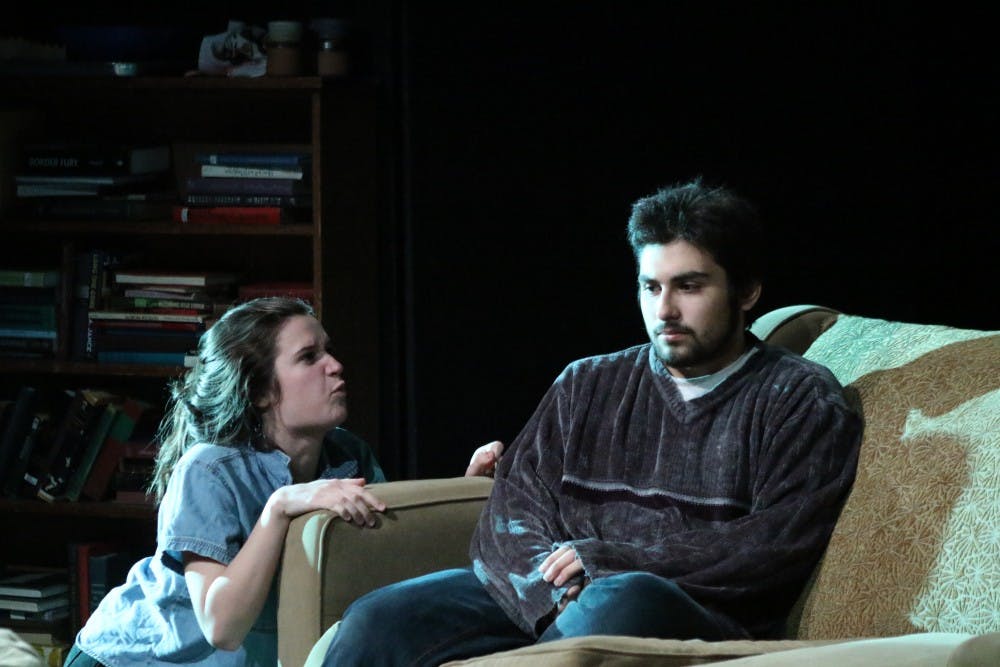What: Seascape with Sharks and Dancer
Where: The Cave Theatre
When: Feb. 23- Feb. 27 at 7 p.m. and Feb. 27- Feb. 28 at 2:30 p.m.
Ticket information: Tickets cost $6 and can be bought at the University Theatre Box Office
In a show with only two characters, student actors will explore a “Seascape with Sharks and Dancer” in the Cave Studio Theatre, opening Feb. 23.
After rescuing a woman named Tracy, played by junior acting major Margaret Morgan, from drowning, a librarian and writer named Ben, played by sophomore musical theatre major David Ibarra, is challenged with trying to understand her and is thwarted at every turn.
"She’s a very demanding force,” Ibarra said.
This production will be taking the script further than other productions in several ways, said the director, Maureen O’Leary, who is a junior directing major.
“The back of the [script] describes it as an off-beat love story,” said O’Leary, “but we’ve taken that image and turned it on its side a little bit.”
In order to do so, they have opted for a more surrealist representation of relationships through the natural order of the world.
“We're taking some of the ideas in the script and blowing them up to assume a bigger proportion,” said O’Leary. “Let’s just say that the world of the play is not what it originally seems to be.”
One way that they are enhancing script elements is through the character of Ben, who Ibarra will be portraying as a kind of sociopath, even though he was not necessarily written to be this way.
“He’s actually kind of a sociopath in the sense that he doesn’t really care for consequences, but in the text, the playwright wrote him in as a very sweet kind of guy, a very patient man,” said Ibarra. “When we first went over the script, we didn’t see him as this bad person, and I’m not saying that he is a bad person now, but... he’s not necessarily a good person either. It’s interesting that we are taking it in a different direction.”
Ibarra expressed that he’s had a lot of fun playing a sociopathic character, and that it’s been a challenge to not pass judgment on Ben because of this trait.
“It’s a challenge because I’ve never had to be someone like this before,” he said. “It’s something we’ve been talking about in my classes. We talk about how these characters are real in that there is a possibility of these people existing and that we can’t judge the character because it could be a very real, valid person. It’s been a challenge not to judge my character.”
As the show progresses, the story will delve deeper into the progression of the relationship between the two characters.
“We are focusing on how a parasitic force, Tracy, interacts with a malevolent force, Ben. We are exploring the cyclical nature of relationships and how we often repeat the same situation and expect a different outcome” O'Leary said.
In the process of developing this show, the cast and the director worked together to discern the meaning of the title. According to O’Leary, they have taken it to be symbolic for the different story elements, with the seascape being the environment in which the story takes place, the shark being the obstacle the characters must overcome, and the dance being the method as to which that obstacle is overcome.
The environmental aspect of the show presented a chance for the crew to get creative with set and light design. According to O’Leary, they have been working to create an “otherworldly cavernous underwater space... an ambient world that affects how the characters interact with the space.”
As a student director, O’Leary expressed that the process has been a learning experience for her, especially in regards to the process of “killing your darlings,” a saying that means getting rid of something about a piece to which one is very attached for the benefit of the whole work. For example, O’Leary remembers having a specific preconception of the relationship between the characters that went out the window as soon as she started working with the actors.
“I thought I had the relationship between Tracy and Ben boxed into a very small corner,” she said, “but when my actors came in for the first reading, they really challenged me to unpack that container and see the relationship in a totally different way than I was viewing it.”
Along the same vein, O’Leary hopes that audience members will be able to walk away from the show with a reconsideration of typical relationship dynamics.
“Often, I think in literature or drama or movies, we don’t see how sometimes there is no bad guy, and crazy attracts crazy, and the mess is much more complicated than we give it credit for,” O'Leary said. “Nobody is the demon; both take part in the dysfunction.”





